Summer is coming to a close so it’s time for another seasonal reading recap. My summer reading was sporadic and not as focused as I wanted. I am at peace with chalking that up to Covid brain. In the summer I tend to gravitate toward lighter reads, moving to more serious books in the fall and winter. What can I say, 21 years of academic discipline really shapes the routines. Despite taking long (for me) reading breaks and wanting lighter reads I still read some excellent books.
I’m still breaking down my reads by fiction and non-fiction and poetry and disclosing what format I am using to consume my books. I learned that this summer I utilized audiobooks more than normal, when doing chores or taking a solitary evening walk seems to be a good moment to take a moment to myself and dive into the distration of another story. I also didn’t enjoy any new poetry this summer. I don’t think I would have realized that without this little roundup. Now without further ado, here’s my summer reads:
Fiction
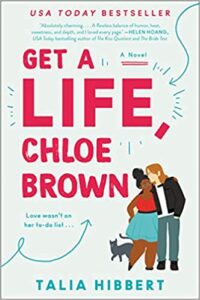 Get a Life, Chloe Brown by Talia Hibbert
Get a Life, Chloe Brown by Talia Hibbert
Format: Audiobook; Length: 10 hours
Welcome to the heart of the pandemic where I learned I actually like romance (occasionally). What I loved about Get a Life Chloe Brown was the representation Hibbert created in her main character who struggles living with fibromyalgia. This one was far more steamy than i was expecting but still a good, fun read.
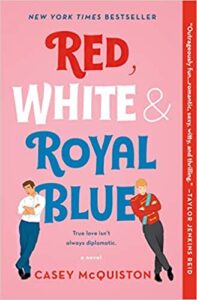 Red, White & Royal Blue by Casey McQuiston
Red, White & Royal Blue by Casey McQuiston
Format: Hardcopy; Length: 423 pages
I loved this book so much, Red, White and Royal Blue is one that I have told all my friends to read if they need something fun and hope in the midst of this pandemic. The president is a woman from Texas with a biracial Latinx family. Her son has a rivalry with the Prince of England until a public relations nightmare forces them to set aside their differences. A fun romance and joyful imagining of what our world and the American political landscape could be.
 Anna K by Jenny Lee
Anna K by Jenny Lee
Format: hardcopy; Length: 400 pages
A modern retelling of Tolstoy’s Anna Karenina, think Gossip Girl but will age better, be less problematic and the cast of characters is more diverse. Anna K had me laughing and crying but mostly turning the pages to find out what happens next. I hear jenny Lee is writing a follow up that will be all her own story and I cannot wait.
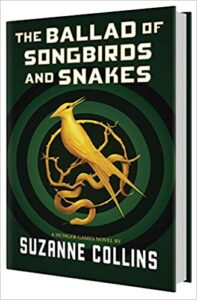 The Ballad of Songbirds and Snakes by Suzanne Collins
The Ballad of Songbirds and Snakes by Suzanne Collins
Format: Audiobook; Length: 16 hours
A prequel to the Hunger Games trilogy that reveals how President Snow became President Snow. Did we need this book? No. Did this book give me anything new? Not really. But is Suzanne Collins excellent at telling a story? Yes, yes she is. A quick read, that unfortunately didn’t entirely pull together at the end because the twist was rushed. Nevertheless, it was entertaining like the original trilogy and if Collins came out with another prequel I would probably read it. What can I say, my reading taste is sometimes questionable.
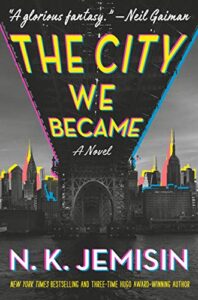 The City We Became by NK Jemisin
The City We Became by NK Jemisin
Format: Hardcopy; Length: 437 pages
I had read short stories from Jemisin’s How Long Til Black Futures Month, but this was my first full length novel by Jemisin to tackle and I am smitten. The City We Became is sci-fi for thinkers, as Jemisin creates a world where cities are embodied by avatars as they age and come to life. This is the first in the trilogy and I cannot wait to read the next two books.
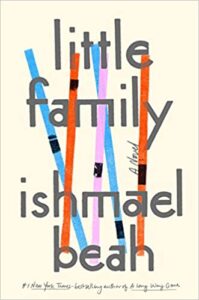 Little Family by Ishmael Beah
Little Family by Ishmael Beah
Format: Hardcopy; Length: 263 pages
Ismael Beah the memoirist of A Long Way Gone: Memoirs of a Boy Soldier returns with a fiction book about a group of children on the verge of young adulthood that have formed a little family, living in an abandoned airplane and scraping together a life. I loved this book but also wanted more. I would have happily read another 50 pages of Little Family to get more of the background stories of the characters.
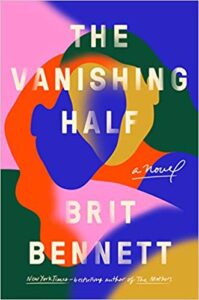 The Vanishing Half by Brit Bennett
The Vanishing Half by Brit Bennett
Format: Hardcopy; Length: 343 pages
As you know The Vanishing Half was one of my most anticipated books of 2020. I enjoyed Bennett’s The Mothers and was hopeful this one would capture my heart as well. A story of two light skinned black sisters, one who passes as white and slips into another life and one that chooses to lean in to her blackness, spans multiple generations and decades. I loved it.
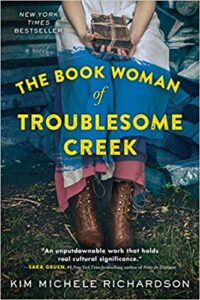 The Book Woman of Troublesome Creek by Kim Michele Richardson
The Book Woman of Troublesome Creek by Kim Michele Richardson
Format: Audiobook; Length: 9 hours
A historical fiction novel set in the hills of Kentucky, The Book Woman of Troublesome Creek explores not only the pack horse library system during the Great Depression, but a strange medical condition that created a whole line of people with blue skin. I enjoyed this read, because I didn’t know about this medical condition and its impacts on those who had it.
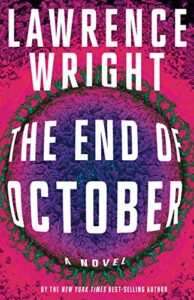 The End of October by Lawrence Wright
The End of October by Lawrence Wright
Format: Audiobook; Length: 13 hours
Sometime in late summer I thought I could handle a book about a global pandemic in the midst of a global pandemic. The End of October was a quick and fast paced read that followed an infectious disease doctor that studies, tracks and prevents the spread of deadly viruses as one slowly unravels civilization. But did the virus come about from a zoonotic jump or were the Russians involved in creating and spreading this disease? A very close to home read, so not for everyone right now.The pacing was quick and I read it in about two days. I wanted 20 more pages at the end so the tie ups weren’t so rushed and sloppy.
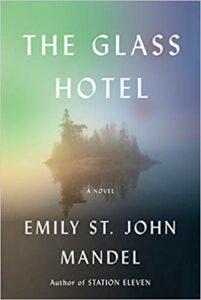 The Glass Hotel by Emily St John Mandel
The Glass Hotel by Emily St John Mandel
Format: Audiobook; Length: 10 hours
I was captivated by Mandel’s debut Station Eleven with its shifting timeline and seemingly unconnected characters that she so deftly pulls together at the end. Her writing style in Station Eleven is unconventional but works well. The Glass Hotel has many of the same elements—seemingly disconnected characters in different settings moving along different plot and time lines. I felt like this book had all the right elements but the thread pulling them together was too loose. Like the apocalypse pulls together all the stories in Station Eleven, the 2008 economic crash is supposed to be the thread that pulls the elements, characters and story lines together on this one—but that event didn’t have enough tension in the story to create the same effect as Station Eleven. For me, it had “a close but not quite” effect.
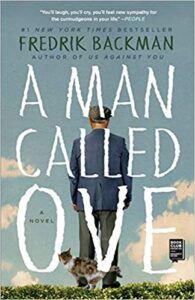 A Man Called Ove by Fredrik Backman
A Man Called Ove by Fredrik Backman
Format: Audiobook; Length: 9 hours
I couldn’t get into A Man Called Ove when I picked up the hardcopy several years ago, but I gave it another try on audiobook when I was between holds and looking for something to listen to while working. I see why this sweet story of grief and the healing power of community received such excellent reviews. Once you get past Ove’s grumpy exterior, this book is a gem.
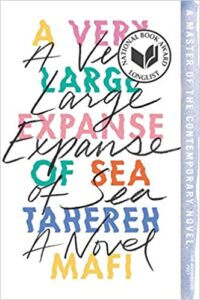 A Very Large Expanse of Sea by Tahereh Mafi
A Very Large Expanse of Sea by Tahereh Mafi
Format: Audiobook; Length: 7 hours
Long listed for the National Book Award, this YA book about a teenage Muslim girl post-911 delivers all the things more recent YA has gained a reputation for doing—tackling difficult issues while still delivering the romance and relationship and joy the genre does well. A Very Large Expanse of Sea explores the nuance of what it was like to be Muslim in an American filled with racism and xenophobia but also what it’s like to just be a teenager. Plus there’s a breakdancing plot that is so fun.
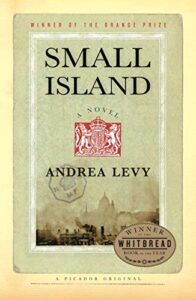 Small Island by Andrea Levy
Small Island by Andrea Levy
Format: Hardcopy; Length: 441 pages
“It was inconceivable that we Jamaicans, we West Indians, we members of the British empire would not fly to the Mother Country’s defense when there was a threat. But, tell me, if Jamaica was in trouble, is there any major, any general, and sergeant who’s would have been able to find that dear island?” Andrea Levy is the daughter of Jamacan immigrants in London who loved the black fiction of America but couldn’t find fiction that expressed the black experience in England so she set out to create it. This was my first Andrea Levy novel but won’t be my last. Small Island is about the relationship between England and its colonies during and post-WWII. HIghly recommend for fans of historical fiction to understand the tension between England defending themselves against the Germans while still being colonizers themselves.
Non-Fiction
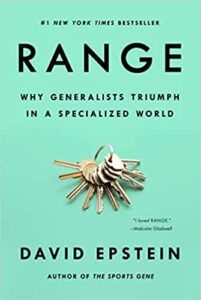 Range: Why Generalists Triumph in a Specialized World by David Epstein
Range: Why Generalists Triumph in a Specialized World by David Epstein
Format: Hardcopy; Length: 352 pages
I read this as part of my alumni association book club. Like most books of this ilk, Range had helpful things to glean but also featured incredibly problematic research or at least interpretations of research. I think we need to just stop using late 19th century research on indigenous peoples because of the inherent racial bias that shaped not only the questions but the conclusions drawn from the research. That large critique aside, I did appreciate the argument the author makes for gathering many skills and debunking the Tiger Woods theory and the Malcolm Gladwell 10,000 hours theory.
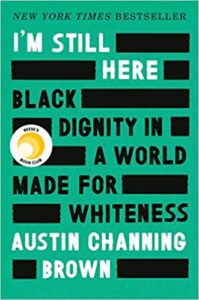 I’m Still Here: Black Dignity in a World Made for Whiteness by Austin Channing Brown
I’m Still Here: Black Dignity in a World Made for Whiteness by Austin Channing Brown
Format: Hardcopy; Length: 185 pages
“Whiteness constantly polices the expressions of Blackness allowed within its walls, attempting to accrue no more than what’s necessary to affirm itself…It wants to see a Black person seated at the table but doesn’t want to hear a dissenting viewpoint. It wants to pat itself on the back for helping poor Black folks through missions or urban projects but has no interest in learning from Black people’s wisdom, talent, and spiritual depth. Whiteness wants enough Blackness to affirm the goodness of whiteness, the progressiveness of whiteness, the openheartedness of whiteness. Whiteness likes a trickle of Blackness, but only that which can be controlled.” -Austin Channing Brown
For anyone that works in (or worships in) the church and non-profit world I’m Still Here is a must read. The chapter on Good Whiteness made me cringe in the ways I know from previous experience will push me to grow and the chapter on Reconciliation efforts in liberal faith and non-profit institutions provided not just a clear critique but a clear way to reframe and more forward. I will be reflecting on this book in my own work for a while.
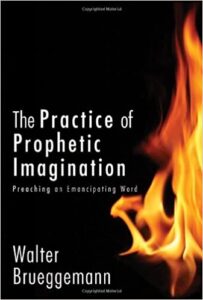 The Practice of the Prophetic Imagination by Walter Brueggemann
The Practice of the Prophetic Imagination by Walter Brueggemann
Format: Hardcopy; Length: 158 pages
I read this volume as part of a cohort group that reads theology and thinks through ministry together. Am I allowed to confess that my June Covid brain struggles to remember what it was about? But it’s Bruggemann and worth reading (or re-reading in my case).
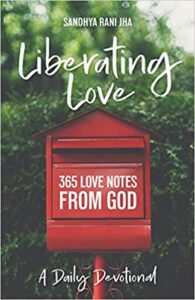 Liberating Love Devotional by Sandhya Jha
Liberating Love Devotional by Sandhya Jha
Format: Hardcopy; Length: 384 pages
My colleague a year ago had this beautiful idea—to write a daily love note from God to readers. Liberating Love is the real deal—the theological depth, the broad appeal to people of all faiths and the tenderness has often left me in tears, relaxing my tense shoulders or just taking a deep breath. I physically relax at their encouragement and perspective and over the past year they have become a touchstone that remind me I am loved. Perfect for reading over coffee first thing in the morning or right before bed each night. It will definitely join the rotation of Mark Nepo and Mary Oliver as part of my daily reflection time.
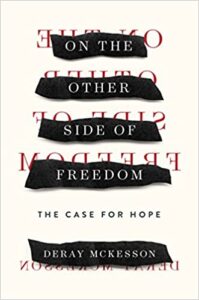 On The Other Side of Freedom: The Case for Hope by DeRay McKesson
On The Other Side of Freedom: The Case for Hope by DeRay McKesson
Format: Hardcopy; Length: 212 pages
“Protest is the work of hope. Protest, at its core, is telling the truth in public. It is confrontation and disruption rooted in the acknowledgment of a future that has not yet come, but that is possible. The work at hand is hope-work.” -DeRay McKesson, The Other Side of Freedom
McKennon, one of the original organizers in Ferguson, has dedicated his life and work to collecting data on police brutality so that public policy could be shaped by information rather than narratives and mythologies about policing in the US. Beyond the story of the movement, McKesson has a way of talking about the movement for black thriving that feels like church.
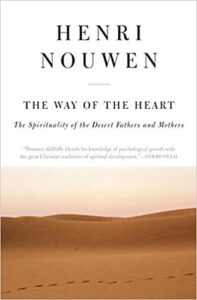 The Way of the Heart: The Spirituality of the Desert Fathers and Mothers by Henri Nouwen
The Way of the Heart: The Spirituality of the Desert Fathers and Mothers by Henri Nouwen
Format: Hardcopy; Length: 96 pages
A small little book but incredibly helpful in articulating why cultivating contemplative practices is vital for the soul. The Way of the Heart explores the wisdom and ways of the desert contemplatives and how they inform our modern spiritual practice.
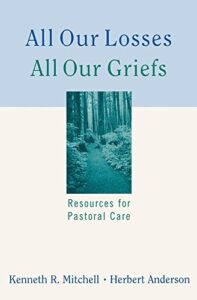 All Our Losses All Our Griefs: Resources for Pastoral Care by Kenneth R Mitchell and Herbert Anderson
All Our Losses All Our Griefs: Resources for Pastoral Care by Kenneth R Mitchell and Herbert Anderson
Format: Hardcopy; Length: 180 pages
One of the books I read for my research, I found a few tidbits in this short but helpful manual about grief. I appreciated the breakdown of theories and terms even if some of the theories were dated. As I search for framing in the work I am trying to build this one was helpful but revolutionary.
Overall I am not as satisfied with my reading life this summer as I am most summers. My focus was waning, even when I read something excellent. I found myself reading half a book, setting it aside for two weeks and then picking it back up to finish. There’s a stack of books I lovingly refer to as my “it’s not you, it’s me” stack. Books I started and enjoyed but didn’t have the focus to finish. I blame it on Covid stress and grief brain which has given me the chance to reflect on my mindfulness practices and how they support my focus and brain health. I am looking forward to a more settled, less stressed fall where I can be a bit more focused in my reading.
Like what you’ve read? Want more? Sign up for my twice a month newsletter (because we’re not spammy) and get original content you can’t find here on the blog. Reflections on faith and living, book recommendations and other good, nerdy fun. Sign up HERE.
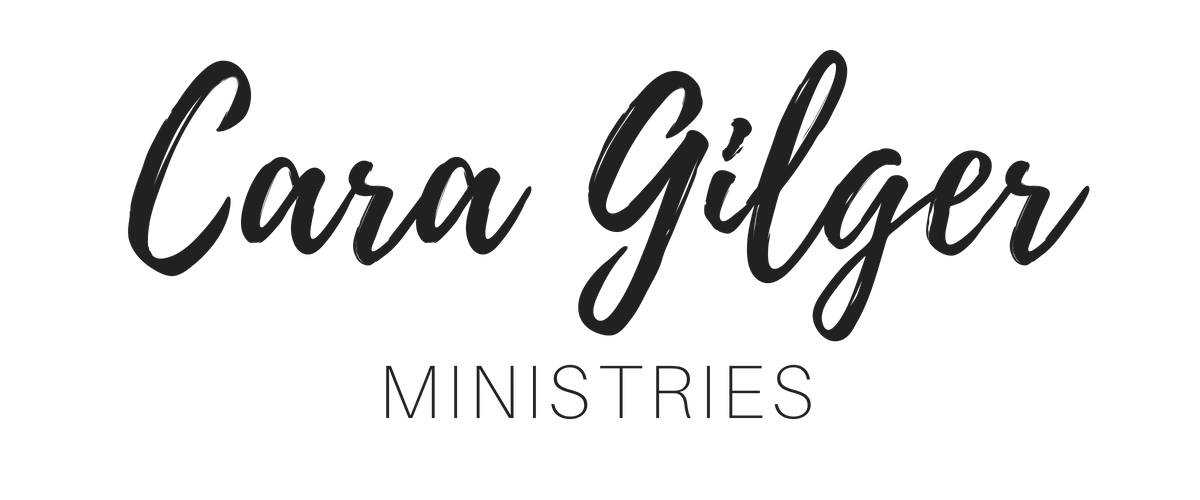


Recent Comments